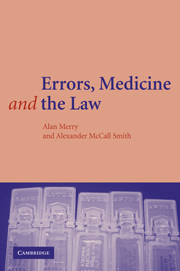2 - The human factor
Published online by Cambridge University Press: 05 October 2013
Summary
Our knowledge of the workings of the human brain has progressed enormously over recent decades, not only in respect of the receptors, transmitters and pathways that form the physical matrix of the brain but also in our understanding of human cognition. It is our human cognitive ability that has given us our highly organised and technologically sophisticated societies, with all their advantages and disadvantages. Yet it is precisely these cognitive processes that also make human beings prone to error. To this risk must be added the fact that the technology and complexity which characterise modern life, and which have resulted from our ability to think, have created an environment in which the opportunities for error are numerous and in which serious harm may readily follow if an error is made. Error, then, should be viewed not as an unfortunate frailty on the part of human beings but rather as an inevitable concomitant of the powerful cognitive processes that have permitted us to extend the limits of human achievement.
There have been good observational data concerning human error since the work of Freud first suggested that errors were not necessarily random events attributable to carelessness, but could be meaningful in terms of a person's psychology. Today, cognitive science can provide considerable insight into the workings of the human mind. This knowledge is of more than theoretical significance: a wider understanding of the processes that underlie our decisions and our actions is essential if we are to make progress in improving the safety of complex systems (such as medical practice).
Information
- Type
- Chapter
- Information
- Errors, Medicine and the Law , pp. 41 - 71Publisher: Cambridge University PressPrint publication year: 2001
